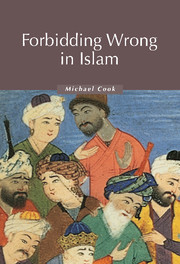Book contents
- Frontmatter
- Contents
- Preface
- Map
- 1 Introduction
- 2 The elements of the duty of forbidding wrong
- 3 How is wrong to be forbidden?
- 4 When is one unable to forbid wrong?
- 5 What about privacy?
- 6 The state as an agent of forbidding wrong
- 7 The state as an agent of wrongdoing
- 8 Is anyone against forbidding wrong?
- 9 What was forbidding wrong like in practice?
- 10 What has changed for the Sunnīs in modern times?
- 11 What has changed for the Imāmīs in modern times?
- 12 Do non-Islamic cultures have similar values?
- 13 Do we have a similar value?
- Index
2 - The elements of the duty of forbidding wrong
Published online by Cambridge University Press: 05 June 2012
- Frontmatter
- Contents
- Preface
- Map
- 1 Introduction
- 2 The elements of the duty of forbidding wrong
- 3 How is wrong to be forbidden?
- 4 When is one unable to forbid wrong?
- 5 What about privacy?
- 6 The state as an agent of forbidding wrong
- 7 The state as an agent of wrongdoing
- 8 Is anyone against forbidding wrong?
- 9 What was forbidding wrong like in practice?
- 10 What has changed for the Sunnīs in modern times?
- 11 What has changed for the Imāmīs in modern times?
- 12 Do non-Islamic cultures have similar values?
- 13 Do we have a similar value?
- Index
Summary
This chapter is mainly concerned to answer three basic questions about the duty of forbidding wrong: who has to do it, to whom, and about what? Once we have dealt with these elementary questions, we can go on in later chapters to more advanced issues, ranging from the techniques for forbidding wrong to the limits placed on them by considerations of privacy. But before we tackle our three basic questions, we have to start by briefly disposing of a more fundamental one: why should there be a duty to forbid wrong?
Why?
The reason this question will not detain us long is that the Muslim scholars had a simple and straightforward answer to it: God had imposed the duty, and had made His will known through explicit statements in both Koran and tradition. (Sometimes this is backed up by reference to consensus (ijmāʿ), but we can leave this aside.) A considerable range of Koranic verses and traditions were cited in this connection, but one particular verse, and, among the Sunnīs, one particular tradition, have pride of place. We have already met both.
The verse is Q3:104: ‘Let there be one community (umma) of you, calling to good, and commanding right and forbidding wrong; those are the prosperers.’ In the wider context of the passage, ‘you’ refers to ‘those who believe’ (Q3:102), so that it is natural to take God to be addressing the Muslims in general.
- Type
- Chapter
- Information
- Forbidding Wrong in IslamAn Introduction, pp. 11 - 26Publisher: Cambridge University PressPrint publication year: 2003
- 1
- Cited by

